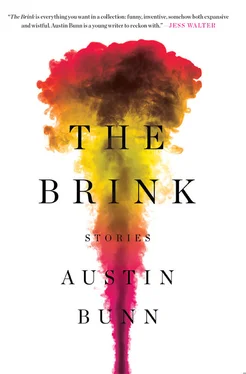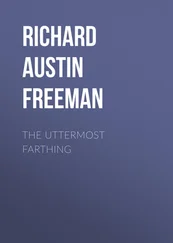She was fed and given a swath of tarpaulin for shade. While Coralito comforted her, Alfredo and Armando rigged a small shelter with a split-bunk post and cord fixed to the prow. They left Coralito and rowed back to the Elena .
“I felt her breath,” Armando whispered. “It was cold, like a winter draft.”
“Her eyes are black,” Alfredo added. “But her pain is as real as any.”
By nightfall, Coralito called for the dory. Back on ship, he steadied himself at the mast. “She is no dream,” he said.
“What does she know of the captain, of the others?” I asked.
“Where did she come from?” Armando asked.
“It is a peculiar story,” Coralito began, chewing his nail. She told him that one day, she awoke on a shoreline crowded with people. The sea there was tideless and still. Inland, trees loomed over the shore, a forest so dense it seemed like a wall. People there wandered along this shore as far as she could see, men and women of many ages, colors, and costumes, speaking in strange tongues. Each appeared to travel alone, and they often stopped her and asked for things, but she was afraid and pulled away. Eventually, she said, she began walking too. She never saw the same face twice.
At one moment, a moment that she could not separate from other moments, Isabela moved into the sea, knee-deep. She had never thought to enter the water before. But something called to her. From the mist, the longboat drifted into her sight. She got in. The crowds from the shore saw and rushed at the water. The fathom line snapped taut and she found herself pulled out to sea. She held tight as a mist enveloped her. The sound of the voices faded until it was replaced by a rumble and the sense of vertiginous turn. The next she knew, she could make out the Elena .
Coralito stopped and ran his hand across his face, wiping the disbelief. Armando the Taller crossed himself.
“I asked for her hand and made a cut along her finger,” Coralito continued. “Her blood is red and real.”
“Lie. She doesn’t bleed,” said the conscript, nodding to Diego. “Just like the mute. They’re both wraiths now.”
The crew stared at Diego. He did not look up.
I said, “Come morning, we return her to the ledge.”
Coralito tugged his tunic taut against his chest. “Then I go with her,” he answered. “I will not leave my wife.”
“Diego goes too,” Armando said.
His brother stepped toward him. “But what if there are others, abandoned over the ledge? Are we to leave them in purgatory?”
Armando shook his head. “Anything else would defy God’s will.”
Alfredo’s face lost its softness. He seemed to rise up his whole length. “You speak of God’s will?” he shot back. “Was it God’s choice to take our brother? Or yours?”
The brothers leapt on each other and wrestled to the deck. They fought, equally matched, like a man with his reflection. If no one stopped them, it was because we felt we were watching the war within us playing out. Each man aboard — Coralito, the conscript, Diego, Marco, and the other deckhands — understood that the ledge was now among us. We could pass over the edge or we could plunder it, but we could not escape. We watched in silence until the two brothers sat across from each other, exhausted and bruised. Blood ran from Alfredo’s nose and his brother rubbed his jaw.
“I remember him,” Alfredo said. “He was our brother. And if he is still alive, I will go and get him myself.”
That night, there was no reversing of the sand clock, no order to the Elena . Coralito boarded the dory and was rowed out to his wife. The men drained the wine casks and fired all the supplies in a noisy feast. Diego stood at the prow, ignoring me, even more pale, like alabaster. He paced, the way a wife grooves a path of anticipation on a widow’s walk, and stared out at the ledge. I could find no consolation in the riot around me and the chill air had me missing the simple heat of my mother’s bakery. Why had I ever left? Why is it that men are always leaving? What is this hunger for what we can’t see? I ached for the Calle de la Mar, for the sounds of the fruit carts jostling, and to see one more time my mother at the doorway and to smell her honey cakes rolling out into the street. I called to her in a prayer. I wanted to see her face again and feel blessed, but I could not summon the whole of it. It remained blurred, like smoked glass, and the knowledge that I had forgotten it filled me with a clawing emptiness. The night wore on. The crew’s exuberance faded into melancholy, and they keened for their families and home cities, for those they would never see again. I fell asleep in a curl of loose sail.
I woke to a jerk. Under the first kindling of clouds, the fathom line was already strung out to the ledge and Alfredo, Diego, and others, with a great cry, pulled together.
“What are you doing?” I asked. None turned to answer me.
Armando shoved his way forward, shouting, “This is blasphemy!” But before he could fight, the longboat returned over the ledge and came through the spray, laden with three new figures.
“Armando? Alfredo?” yelled a young man, standing in the boat. “Is that you? I felt you calling me!”
Armando stepped toward the gunwale, squinting, his mouth open.
“Brother!” Alfredo called back. “We’re both here! Come to us!”
The longboat knocked alongside the Elena , and Alfredo lifted the young man to the deck with a stevedore’s strength. He looked just like the brothers, though youngest, and his skin had no pigment. He hugged Alfredo with genuine pleasure.
“You seem so old,” he said. “Have you been away?”
“No, no,” his brother said beaming. “It’s you who left us .”
Armando made the sign of the cross. “You are dead,” he said. “I took your life.”
A laugh shot out of his brother. “You took nothing.”
A boy followed up the rope ladder, unkempt, in tattered trousers. He was not more than five or six years old, and a swollen lump rested at the base of his neck. It had been years since I’d seen a mark of the plague. The boy stood bewildered by the unfamiliar faces until the ship’s gimbaling startled him and he began to shake and cry. Diego pushed his way forward to face the child.
“My son,” he said, collapsing around the boy. “My son.”
Diego’s voice. The sound of it shattered me, the deepest chime of the closest, celestial sphere.
When the final figure boarded the Elena , holding her head down in humility, I knew that I had called her. Those who crossed the ledge did so because we summoned them with yearning. Her shirt was soaked, a damp rag giving no warmth, though none was needed. When she looked up, I understood why the crew had mutinied: Death is the tyranny. To conquer the ledge was a conquest over this. The greed of time.
My mother stood before me, wet and shivering in her resurrection. Her black eyes studied me in a bloodless face.
I embraced her, and as I did, I noticed the odd twist in her body, her neck stretched. An angry, red indentation wrapped around her throat. My fingers sought it out and ran these ridges where rope had once been.
“I told you to never leave,” my mother said.
My strength left and I buried myself in her hair. “Forgive me,” I said. I remained there until I felt a lock of it brush against my face in a breeze.
From where I sit, I watch the crew busy with lines. Every one is now strung over the ledge. In time, each snaps taut and the deckhands pull first the longboat, then a handful of crude rafts around the ledge, heavy with people. Soon, the Elena is crowded with men and women, in all kinds of dress and colors, my mother among them. I write in the ledger, “Many new souls.”
Читать дальше











